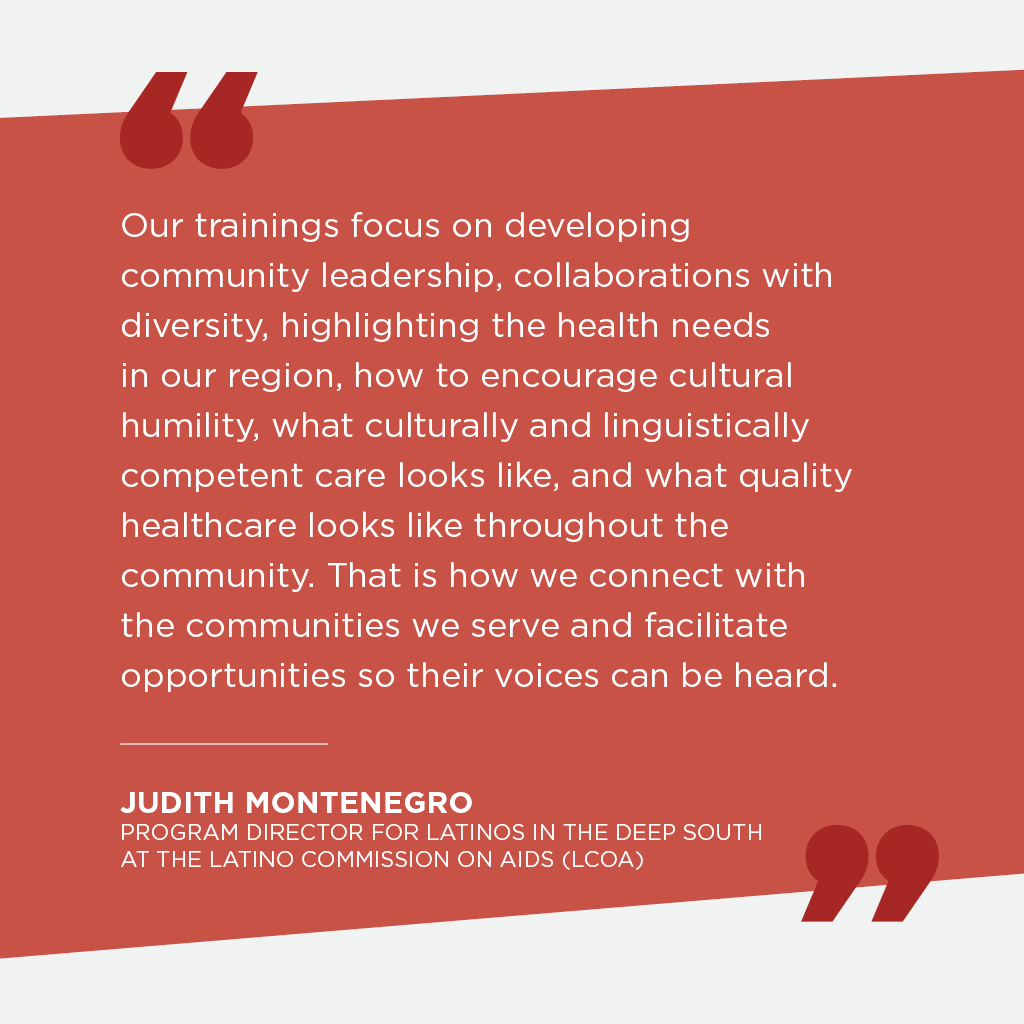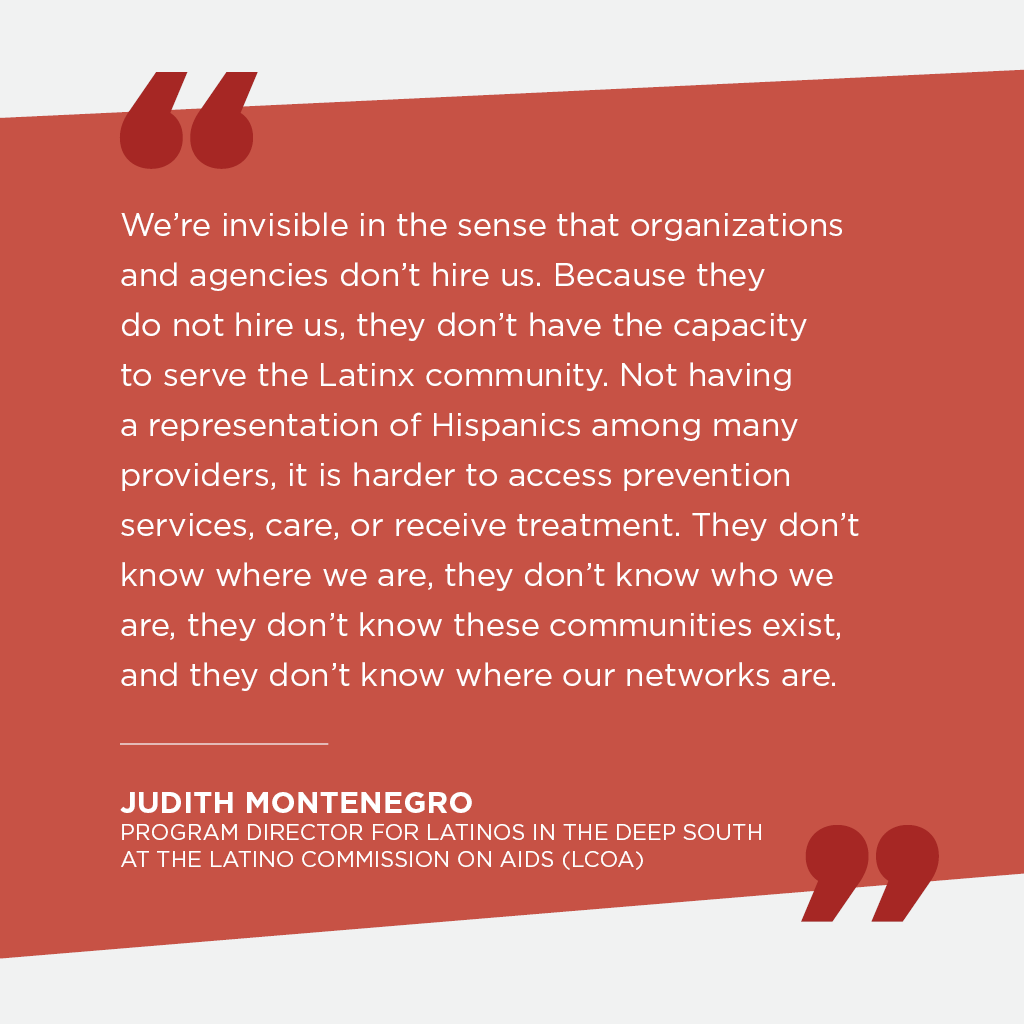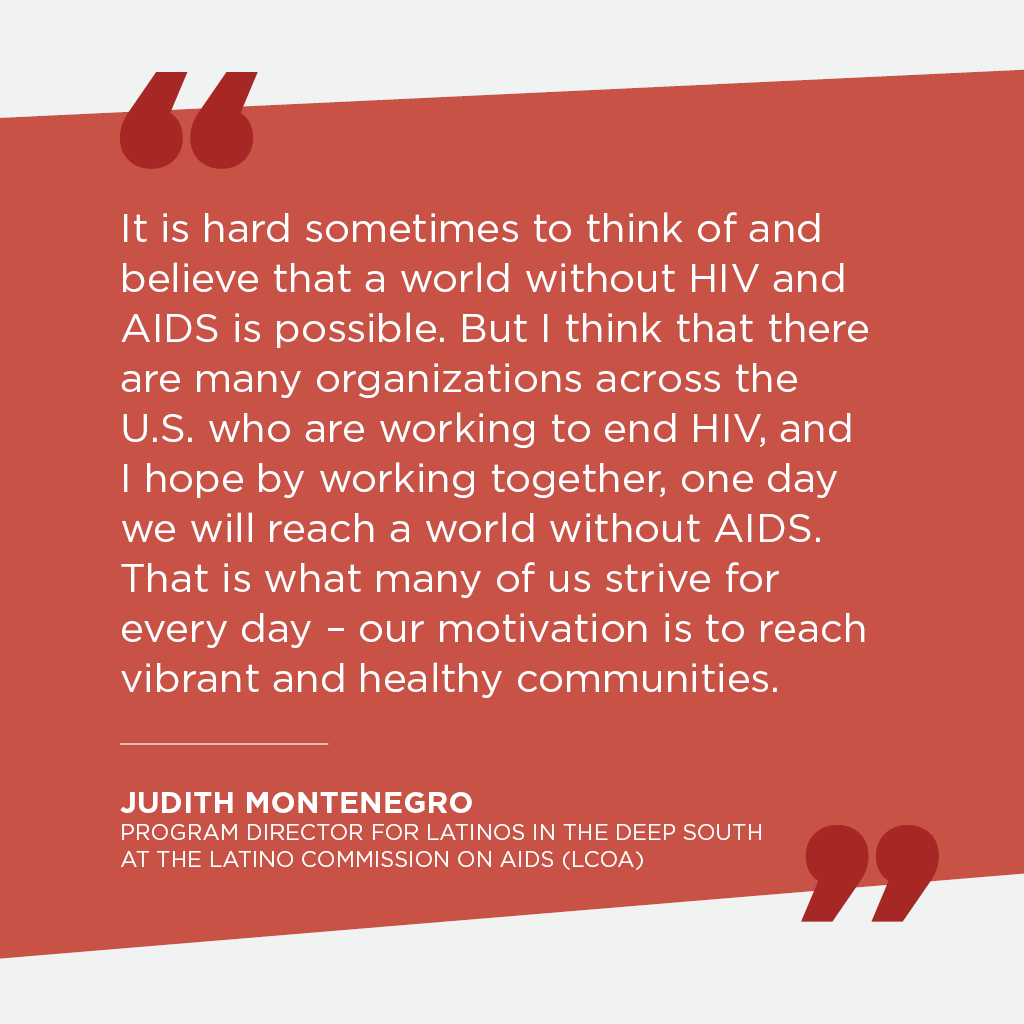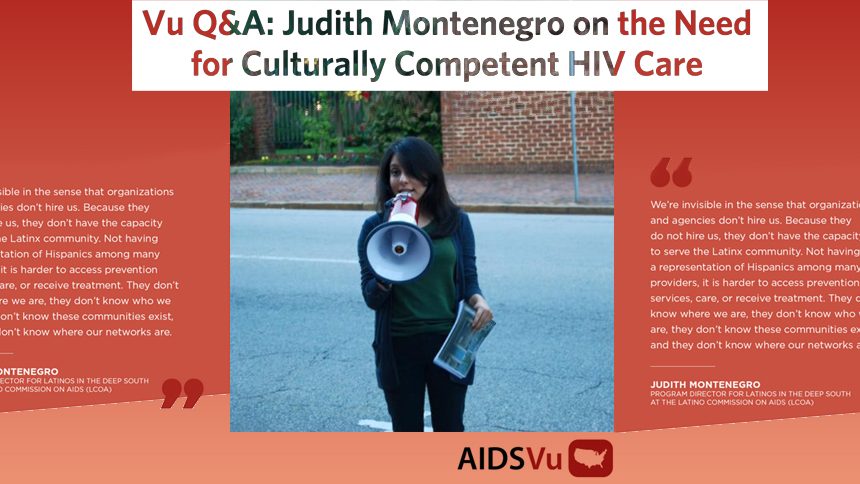Judith Montenegro, Program Director for Latinos in the Deep South, a program of Latino Commission on AIDS (LCOA)
Q: You have been working on the Latinos in the Deep South program for the Latino Commission on AIDS for almost six years. What motivated you to get involved in this work?
I grew up in the South, and I think that when you’ve lived here as long as I have, you begin to see what the disparities look like. From 2003 to 2008, I was organizing around community action to impact the narratives around immigration issues. There were waves of anti-immigrant legislation at the federal and state levels, especially in the South. I think my work around HIV came naturally after that because the HIV/AIDS historical and social movement originated, in essence, as a social justice movement. It informed how other communities should be organizing and what that could look like in terms of involving people who were the most highly impacted. The HIV movement was built by so many people who really paved the way for many other movements around the world. It was a natural transition for me to integrate the work I was doing around immigrants and social justice into working on the impact of HIV among Hispanic/Latinx.

Q: The Latinos in the Deep South program is committed to developing engagement models that are unique to each Latinx community, with the goal of reducing stigma and building healthcare infrastructure. How does the program work to achieve its goals?
For a long time, very few organizations at the national level were working in the Southeast. We disseminated a report looking at the issues around the Latinx community and the immigrant community in obtaining HIV care, preventative, and treatment services. The program was initially developed to look deeply at what was happening here, provide tools and resources, and mobilize communities to achieve the changes necessary when the local health department or providers were just not able to keep up with the changing population here in the South.
The South has become a new destination for many immigrants, particularly from the Latinx community in places like Mississippi and Tennessee. Places like New Orleans, that have a stronger tie to Latin America, saw an influx of people coming in after Hurricane Katrina. Our program set out to address what these changes meant to communities in the South. We focus on keeping everyone accountable to the services that communities are entitled to through community organizing and capacity building. Our trainings focus on developing community leadership, collaborations with diversity, highlighting the health needs in our region, how to encourage cultural humility, what culturally and linguistically competent care looks like, and what quality healthcare looks like throughout the community. That is how we connect with the communities we serve and facilitate opportunities so their voices can be heard.
Q: In 2016, the South accounted for 43% of all new HIV diagnoses among Hispanics/Latinx. While new diagnoses are decreasing across all races/ethnicities, Hispanic/Latinx new diagnoses are decreasing at a much slower rate. In your opinion, what is driving the disproportionate impact of HIV on Hispanics/Latinx, especially in the South?
I think what is driving this is that we’re invisible. We’re invisible in the sense that organizations and agencies don’t hire us. Because they do not hire us, they don’t have the capacity to serve the Latinx community. Not having a representation of Hispanics among many providers, it is harder to access prevention services, care, or receive treatment. They don’t know where we are, they don’t know who we are, they don’t know these communities exist, and they don’t know where our networks are. For me, the biggest challenge is that because providers, state, and local institutions fail to invest in bilingual and culturally responsive staff, our communities feel forgotten. Services tailored to Latinx often just do not exist. If I can find a provider who is bilingual in a rural area, it really changes communities and changes how people seek services. Having people in strategic positions, not just having outreach staff, but investing in and looking for providers, nurses, desk staff – that all helps break down the isolation the Latinx and immigrant communities feel. It’s so hard to reach these communities because there isn’t trust. But if you hire someone from the community that has that community’s trust, it’s much easier to break into some of those siloes.

Q: How does visualizing HIV data help support your work with community engagement in the South?
A few years ago, we asked AIDSVu to create a map for us about what the infection rate looked like in the South. Taking these tools and using the data to visualize what is happening has really helped us show community members what HIV and AIDS is, as well as help them use the tools that exist. I did a training in Baton Rouge for Louisiana AIDS Advocacy Day some time ago and presented some of AIDSVu’s maps, showing what some of the parishes look like in terms of prevalence and new diagnoses. In a room full of advocates, alongside people who were living with HIV and people who have been in this field for a really long time, many had never seen that image. There was a shock in the room, just being able to see it and having this to present to their legislators and say, “This is happening in your parish. Why aren’t dollars being invested?” Or being able to take it to health departments and say, “How can we change this?” That really creates opportunities for conversations. Sometimes people don’t understand the percentages or the numbers when we start talking data with advocates, but these visuals make it easy to see where the urgency is and to talk to each other about why this is happening here in the South.
Q: What does LCOA plan to focus on in 2019 and beyond to advance its goal of reducing stigma and building healthcare infrastructure for the Hispanic/Latinx community?
Looking forward, we are focused on addressing stigma and building infrastructure that will be able to provide quality, accessible healthcare for the Latinx and immigrant communities. We’re investing in building up LGBT Latinx programming in the South and making sure that the organizations that exist are growing and are sustainable. With the support of AIDS United and other institutions, we have received funding to provide capacity building to some LGBT Latinx programs and organizations, as well as work on joint programs with them.
On the one hand, you have a community doing this advocacy work, destigmatizing behavior, and challenging cultural norms to be more representative of the communities that exist. It is this investment in providing not only funding but also capacity building, that has really changed the direction of our program. When we first started, there was only one official program doing LGBT Latinx programming in the South (as a caveat, we don’t count Florida and Texas in our definition of the South), so two years ago, we helped build the capacity of other grassroots organizations and programs. Now there is an organization in Atlanta that has their own 501c. We’ve also been working with a trans-led organization in New Orleans. There are three other organizations and one more program that have emerged, and we are trying to support their efforts by investing our time and support, sharing resources, networking with them, helping them build coalitions, and bringing them to the table with us.
 Additionally, because of the current administration’s goals around healthcare policy, we’ve become much bolder about what we are asking cities and states to do. We are also holding individual providers more accountable for the work that they do, making sure forms are inclusive of Trans and gender non-conforming communities, and making sure things are available in English and Spanish. We’ve become more vigilant because these conversations are much easier to have at the local and state levels than they are at the federal level right now. The changes we are making are infrastructural changes that can carry over and protect our communities. Our work is getting much broader, in that sense.
Additionally, because of the current administration’s goals around healthcare policy, we’ve become much bolder about what we are asking cities and states to do. We are also holding individual providers more accountable for the work that they do, making sure forms are inclusive of Trans and gender non-conforming communities, and making sure things are available in English and Spanish. We’ve become more vigilant because these conversations are much easier to have at the local and state levels than they are at the federal level right now. The changes we are making are infrastructural changes that can carry over and protect our communities. Our work is getting much broader, in that sense.
Q: In honor of National Latinx AIDS Awareness Day on October 15, what is your message to the Latinx community?
It is hard sometimes to think of and believe that a world without HIV and AIDS is possible. But I think that there are many organizations across the U.S. who are working to end HIV, and I hope by working together, one day we will reach a world without AIDS. That is what many of us strive for every day – our motivation is to reach vibrant and healthy communities. We want the community to have what it needs and know how to mobilize and to advocate for itself. We ideally want to reach a point where things are as they should be. Because it is hard to imagine this, sometimes we have to reimagine. I want the organizations who are out there to reimagine and to include the Latinx community in that thinking as well.
Source: This article was originally published at www.aidsvu.org


